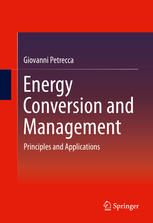

Most ebook files are in PDF format, so you can easily read them using various software such as Foxit Reader or directly on the Google Chrome browser.
Some ebook files are released by publishers in other formats such as .awz, .mobi, .epub, .fb2, etc. You may need to install specific software to read these formats on mobile/PC, such as Calibre.
Please read the tutorial at this link: https://ebookbell.com/faq
We offer FREE conversion to the popular formats you request; however, this may take some time. Therefore, right after payment, please email us, and we will try to provide the service as quickly as possible.
For some exceptional file formats or broken links (if any), please refrain from opening any disputes. Instead, email us first, and we will try to assist within a maximum of 6 hours.
EbookBell Team

5.0
70 reviewsThis book provides an overall view of energy conversion and management in industry and in buildings by following the streams of energy from the site boundaries to the end users. Written for an audience of both practitioners and faculty/students, Energy Conversion and Management: Principles and Applications presents general principles of energy conversion and energy sources, both traditional and renewable, in a broad range of facilities such as electrical substations, boiler plants, heat and power plants, electrical networks, thermal fluid distributions lines and insulations, pumps and fans, air compressor systems, cooling plants, HVAC, lighting, and heat recovery plants. The book also examines principles of energy auditing and accounting, the correlation between energy and environment, and includes detail on the economic analysis of energy saving investment and education in the field of energy.
This book also:
· Explores a broad array of power generation and distribution facilities around the concept of energy conversion, from traditional and renewable sources, correlating many apparently disparate topics
· Elucidates fundamental formulas and information-rich figures to help readers in solving any practical energy conversion problems
· Emphasizes a holistic perspective on energy conversion and management with a vision of each application as a system beyond its individual elements
· Includes a set of Key Performance Index using metrics applicable to energy systems brought into operation over the past 30 years
· Gives a set of basic formulas and data that are the essentials of energy conversion and that everybody involved in these fields should perfectly know
· Adopts a writing style accessible to technicians and managers in the field of energy conversion while maintaining sufficient rigor and coverage for engineers